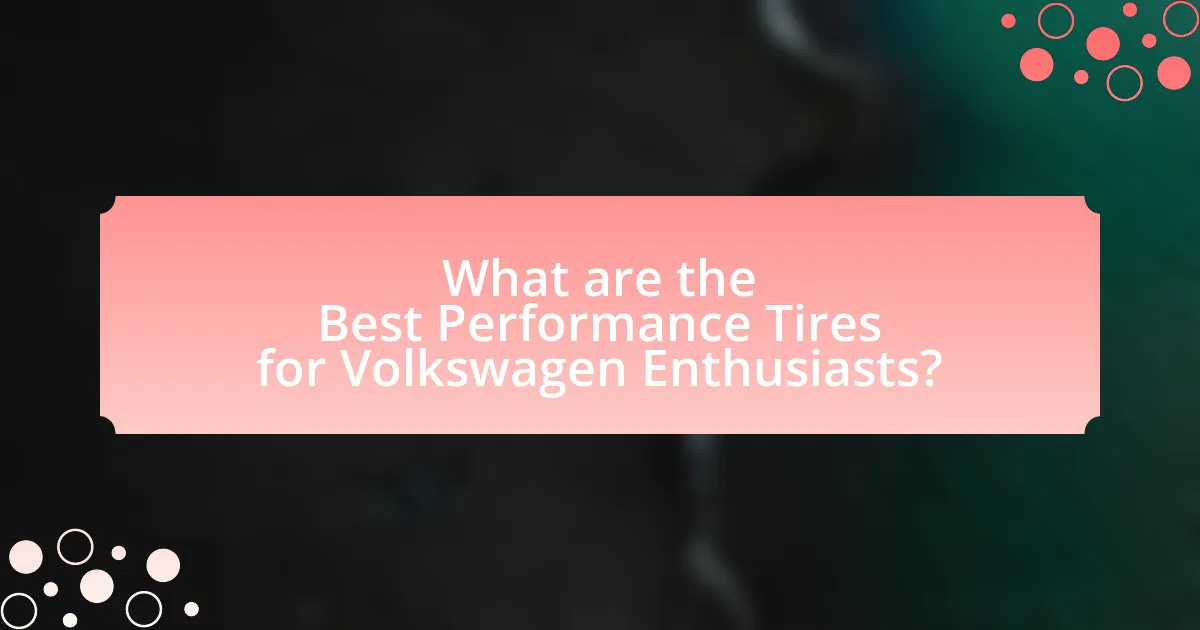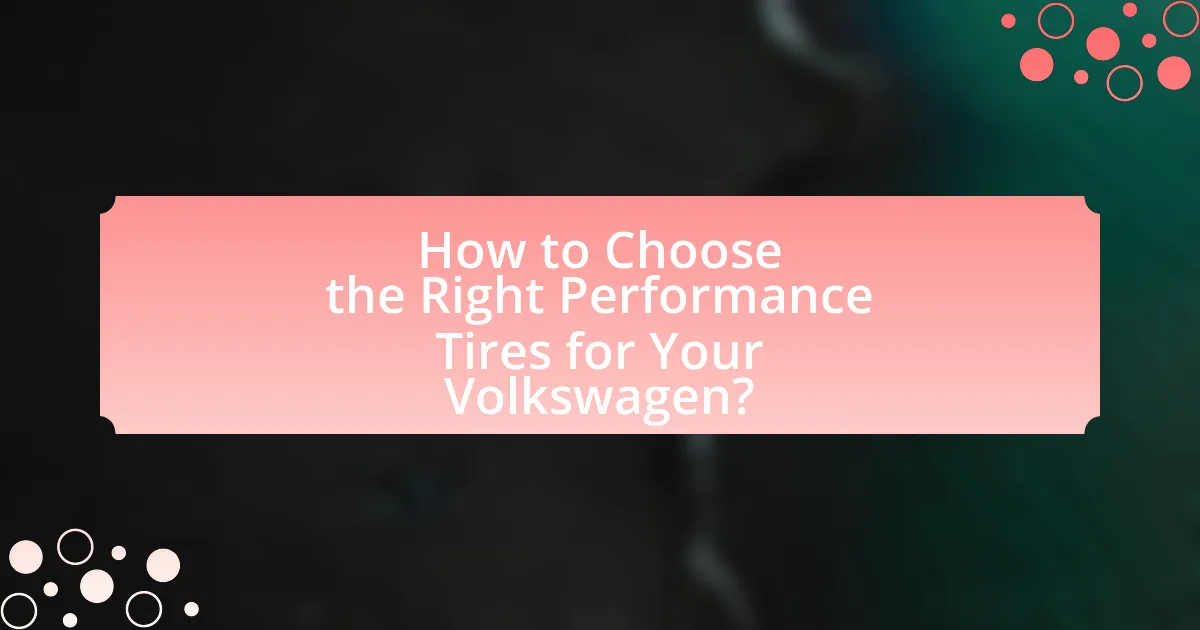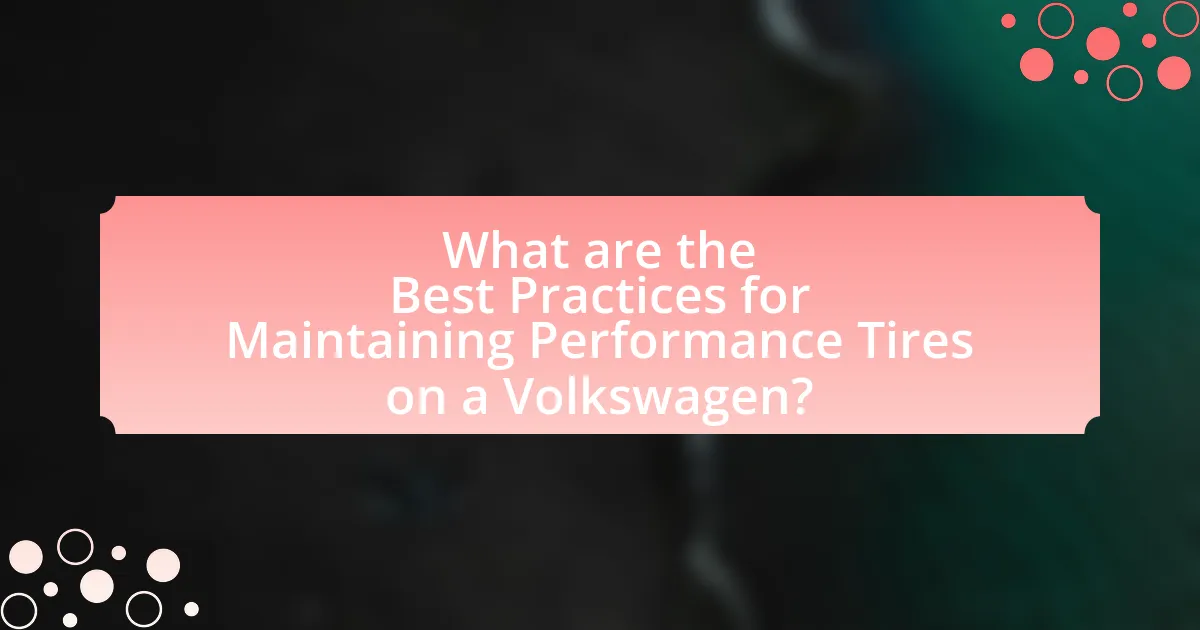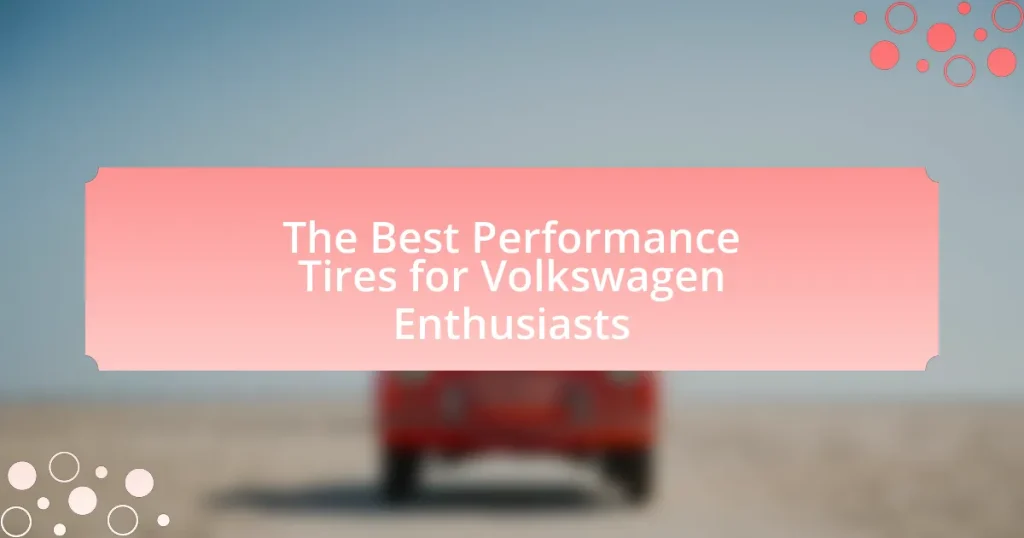The article focuses on the best performance tires for Volkswagen enthusiasts, highlighting top choices such as the Michelin Pilot Sport 4S, Continental ExtremeContact Sport, and Pirelli P Zero. It discusses how performance tires enhance driving experiences by improving traction, handling, and responsiveness, and outlines essential features to consider when selecting tires, including tread patterns and rubber compounds. Additionally, the article emphasizes the importance of proper tire selection for performance vehicles, the consequences of using incorrect tires, and best practices for maintaining performance tires to maximize their lifespan and effectiveness.

What are the Best Performance Tires for Volkswagen Enthusiasts?
The best performance tires for Volkswagen enthusiasts include the Michelin Pilot Sport 4S, Continental ExtremeContact Sport, and Pirelli P Zero. These tires are renowned for their superior grip, handling, and responsiveness, making them ideal for high-performance driving. The Michelin Pilot Sport 4S, for instance, features an asymmetric tread design that enhances cornering stability and wet traction, while the Continental ExtremeContact Sport is praised for its excellent dry grip and predictable handling characteristics. The Pirelli P Zero is often favored for its performance in both dry and wet conditions, providing a balance of comfort and sportiness. These tires are frequently recommended by automotive experts and enthusiasts alike for their performance attributes, making them top choices for Volkswagen models.
How do performance tires enhance the driving experience for Volkswagen owners?
Performance tires enhance the driving experience for Volkswagen owners by providing improved traction, handling, and responsiveness. These tires are designed with specialized tread patterns and rubber compounds that increase grip on both dry and wet surfaces, allowing for better cornering stability and reduced stopping distances. For instance, studies show that performance tires can reduce braking distances by up to 20% compared to standard tires, significantly enhancing safety and control. Additionally, the stiffer sidewalls of performance tires contribute to more precise steering feedback, which is crucial for an engaging driving experience, especially in sporty Volkswagen models.
What specific features should Volkswagen enthusiasts look for in performance tires?
Volkswagen enthusiasts should look for performance tires that offer superior grip, responsive handling, and enhanced durability. These features are crucial for optimizing the driving experience, especially in high-performance models like the Golf GTI or Jetta GLI. Tires with a high treadwear rating, such as those rated 200 or lower, provide better traction and cornering stability, which is essential for spirited driving. Additionally, tires designed with a softer rubber compound improve grip in both wet and dry conditions, enhancing overall performance. Brands like Michelin and Pirelli are known for producing tires that meet these specifications, ensuring that Volkswagen enthusiasts can maximize their vehicle’s capabilities on the road.
How do performance tires impact handling and grip for Volkswagen models?
Performance tires significantly enhance handling and grip for Volkswagen models by providing superior traction and responsiveness. These tires are designed with specialized tread patterns and rubber compounds that improve contact with the road, allowing for better cornering stability and reduced braking distances. For instance, studies have shown that performance tires can increase grip levels by up to 30% compared to standard tires, which directly translates to improved handling characteristics in various driving conditions. This enhanced performance is particularly beneficial for Volkswagen models, known for their sporty design and driving dynamics, making performance tires an essential upgrade for enthusiasts seeking to maximize their vehicle’s capabilities.
Why is tire selection crucial for Volkswagen performance vehicles?
Tire selection is crucial for Volkswagen performance vehicles because the right tires significantly enhance handling, traction, and overall driving dynamics. Performance vehicles, such as those produced by Volkswagen, are engineered for speed and agility, and the tires directly influence these characteristics by providing the necessary grip on various surfaces. For instance, high-performance tires are designed with specific tread patterns and rubber compounds that optimize contact with the road, allowing for better cornering stability and braking performance. Studies have shown that the right tire can reduce lap times by as much as 1-2 seconds on a racetrack, demonstrating the impact of tire choice on performance.
What are the consequences of using the wrong tires on a Volkswagen?
Using the wrong tires on a Volkswagen can lead to decreased performance, compromised safety, and increased wear on the vehicle. Incorrect tire specifications can affect handling, braking distance, and overall stability, which are critical for safe driving. For instance, using tires with an inappropriate load index or speed rating can result in tire failure or blowouts, especially during high-speed maneuvers. Additionally, mismatched tire sizes can cause uneven wear and strain on the suspension system, leading to costly repairs. According to the Tire and Rim Association, using tires that do not meet the manufacturer’s specifications can also void warranties, further emphasizing the importance of selecting the correct tires for optimal vehicle performance.
How do performance tires affect fuel efficiency in Volkswagen cars?
Performance tires generally decrease fuel efficiency in Volkswagen cars due to their design, which prioritizes grip and handling over rolling resistance. The enhanced traction and wider tread patterns of performance tires can lead to increased friction with the road, resulting in higher energy consumption. Studies indicate that vehicles equipped with performance tires can experience a fuel economy reduction of approximately 5-10% compared to those with standard tires, as the latter are optimized for lower rolling resistance. This trade-off is often accepted by enthusiasts seeking improved performance and handling characteristics.
What types of performance tires are available for Volkswagen models?
Volkswagen models have access to several types of performance tires, including summer tires, all-season performance tires, and track-focused tires. Summer tires, such as the Michelin Pilot Sport series, provide superior grip and handling in warm conditions, while all-season performance tires, like the Continental ExtremeContact DWS, offer versatility for varying weather. Track-focused tires, such as the Pirelli P-Zero Trofeo, are designed for maximum performance on racetracks, delivering exceptional cornering and braking capabilities. These options cater to different driving preferences and conditions, ensuring Volkswagen enthusiasts can choose the best fit for their performance needs.
What are the differences between summer, winter, and all-season performance tires?
Summer performance tires are designed for optimal handling and grip in warm, dry conditions, featuring a tread pattern that enhances cornering stability and reduces hydroplaning. In contrast, winter performance tires are engineered with softer rubber compounds and deeper treads to provide superior traction on snow and ice, ensuring safety in cold weather. All-season performance tires aim to balance the characteristics of both summer and winter tires, offering moderate performance in a variety of conditions but sacrificing some grip and handling compared to dedicated summer or winter tires. The differences stem from the specific rubber compounds, tread designs, and intended temperature ranges, with summer tires excelling in warmth, winter tires in cold and slippery conditions, and all-season tires providing versatility at the cost of specialized performance.
Which tire brands are most recommended for Volkswagen enthusiasts?
The most recommended tire brands for Volkswagen enthusiasts are Michelin, Continental, and Pirelli. Michelin is known for its high-performance tires that offer excellent grip and longevity, making it a favorite among Volkswagen owners who prioritize performance. Continental provides a balance of performance and comfort, with tires designed for various driving conditions, which appeals to those who drive their Volkswagens daily. Pirelli is recognized for its sporty tires that enhance handling and responsiveness, particularly for performance models like the Golf GTI and Golf R. These brands are consistently praised in automotive reviews and forums for their quality and performance, making them top choices for Volkswagen enthusiasts.

How to Choose the Right Performance Tires for Your Volkswagen?
To choose the right performance tires for your Volkswagen, first identify your driving style and the specific model of your vehicle. Performance tires vary in tread design, rubber composition, and size, which directly affect handling, grip, and ride comfort. For instance, if you prioritize track performance, select tires with a softer compound for better grip, such as those from brands like Michelin or Pirelli, which are known for their high-performance options. Additionally, consider the weather conditions in your area; all-season tires may suffice for mild climates, while summer tires are optimal for warmer conditions. Always refer to your Volkswagen’s owner manual for recommended tire specifications, including size and load rating, to ensure compatibility and safety.
What factors should be considered when selecting performance tires?
When selecting performance tires, key factors include tire type, tread pattern, size, temperature range, and driving conditions. Tire type determines the intended use, such as summer, winter, or all-season, which affects grip and handling. Tread pattern influences traction and water dispersion; for instance, a directional tread enhances wet performance. Size is crucial for compatibility with the vehicle and affects handling characteristics; it is essential to match the manufacturer’s specifications. Temperature range indicates the tire’s optimal performance conditions, with some tires designed for high temperatures to maintain grip. Lastly, driving conditions, including whether the vehicle will be used on the track or for daily driving, will influence the selection, as different tires perform better under varying circumstances.
How does tire size influence performance in Volkswagen vehicles?
Tire size significantly influences performance in Volkswagen vehicles by affecting handling, traction, and fuel efficiency. Larger tires typically provide better grip and stability during cornering, enhancing overall handling characteristics. For instance, a study by Tire Rack indicates that increasing tire width can improve lateral grip, which is crucial for performance-oriented driving. Conversely, smaller tires may offer better fuel efficiency due to reduced rolling resistance, but they can compromise handling and traction. Therefore, selecting the appropriate tire size is essential for optimizing the performance attributes of Volkswagen vehicles.
What tread patterns are best suited for different driving conditions?
Different tread patterns are optimized for specific driving conditions to enhance performance and safety. For wet conditions, tires with deep grooves and wide channels are ideal as they effectively disperse water, reducing hydroplaning risk. In contrast, tires designed for dry conditions typically feature a solid center rib and fewer grooves, providing better contact with the road for improved traction. For off-road driving, aggressive tread patterns with larger, more spaced-out lugs are essential, as they offer better grip on uneven surfaces. Additionally, all-season tires utilize a balanced tread pattern that combines features for both wet and dry conditions, making them versatile for varied weather. These design principles are supported by tire performance studies, which demonstrate that tread patterns significantly influence handling and safety across different environments.
How can you assess the performance of different tire options?
To assess the performance of different tire options, you can evaluate key metrics such as tread design, rubber composition, and performance ratings. Tread design influences traction and handling, while rubber composition affects durability and grip in various conditions. Performance ratings, often provided by organizations like Tire Rack or Consumer Reports, offer comparative data on aspects like wet and dry traction, road noise, and wear resistance. Additionally, real-world testing and reviews from automotive experts can provide insights into how tires perform under specific driving conditions, ensuring that the selected tire meets the performance needs of Volkswagen enthusiasts.
What role do tire reviews and ratings play in the selection process?
Tire reviews and ratings significantly influence the selection process by providing consumers with insights into performance, durability, and safety. These evaluations aggregate user experiences and expert opinions, allowing potential buyers to compare different tire models effectively. For instance, a study by Consumer Reports indicates that 70% of consumers rely on reviews to make informed purchasing decisions, highlighting the importance of feedback in assessing tire quality. Thus, tire reviews and ratings serve as a critical resource for Volkswagen enthusiasts seeking optimal performance tires.
How can you test tire performance before making a purchase?
To test tire performance before making a purchase, you can conduct a series of evaluations including tread depth measurement, visual inspection for damage, and checking the tire’s specifications against performance ratings. Tread depth affects traction and handling; a depth of at least 2/32 of an inch is recommended for safe performance. Visual inspections should look for irregular wear patterns, cracks, or bulges, which indicate potential issues. Additionally, reviewing tire performance ratings from reputable sources like Consumer Reports or Tire Rack can provide insights into handling, braking, and durability under various conditions. These methods ensure that you select tires that meet your performance needs effectively.

What are the Best Practices for Maintaining Performance Tires on a Volkswagen?
To maintain performance tires on a Volkswagen, regularly check tire pressure, rotate tires every 5,000 to 7,500 miles, and ensure proper alignment. Maintaining the correct tire pressure enhances handling and fuel efficiency, while regular rotation promotes even wear, extending tire life. Proper alignment prevents uneven wear and improves vehicle stability. According to the Tire Industry Association, maintaining these practices can increase tire lifespan by up to 30%.
How can regular maintenance extend the life of performance tires?
Regular maintenance can significantly extend the life of performance tires by ensuring optimal tire pressure, alignment, and tread condition. Maintaining the correct tire pressure prevents uneven wear and enhances handling, while regular alignment checks help avoid misalignment that can lead to premature tire degradation. Additionally, rotating tires at recommended intervals promotes even tread wear, which is crucial for performance tires that are designed for high-speed stability and grip. According to the Tire Industry Association, properly maintained tires can last up to 25% longer than those that are neglected, demonstrating the importance of consistent maintenance practices.
What are the recommended tire pressure levels for optimal performance?
The recommended tire pressure levels for optimal performance typically range from 30 to 35 PSI (pounds per square inch) for most passenger vehicles, including those favored by Volkswagen enthusiasts. Maintaining tire pressure within this range ensures better fuel efficiency, improved handling, and enhanced tire longevity. According to the Tire Industry Association, proper tire inflation can lead to a 3% increase in fuel efficiency and significantly reduce tire wear, confirming the importance of adhering to these pressure levels for optimal vehicle performance.
How often should you rotate and align performance tires on a Volkswagen?
You should rotate and align performance tires on a Volkswagen every 5,000 to 7,500 miles. This frequency helps ensure even tire wear and optimal handling, which is crucial for performance tires. Regular alignment checks are also recommended, especially if you notice uneven tire wear or if the vehicle pulls to one side, as these conditions can affect performance and safety.
What common issues should Volkswagen enthusiasts watch for with performance tires?
Volkswagen enthusiasts should watch for uneven tire wear, reduced traction in wet conditions, and potential noise issues with performance tires. Uneven tire wear often results from improper alignment or inflation, which can lead to decreased handling and safety. Performance tires, while designed for better grip, may sacrifice traction in wet conditions due to their softer rubber compounds, increasing the risk of hydroplaning. Additionally, performance tires can generate more road noise compared to standard tires, which may affect driving comfort. Regular maintenance and monitoring can help mitigate these issues.
How can you identify signs of tire wear or damage early?
To identify signs of tire wear or damage early, regularly inspect the tread depth, sidewalls, and overall tire condition. Checking tread depth can be done using the penny test; inserting a penny into the tread should show part of Lincoln’s head, indicating sufficient tread. Additionally, look for cracks, bulges, or foreign objects in the sidewalls, as these can indicate damage. According to the National Highway Traffic Safety Administration, tires should be replaced when tread depth reaches 2/32 of an inch to maintain optimal performance and safety. Regular visual inspections and maintaining proper tire pressure can also help in early detection of issues.
What steps should you take if you experience a tire-related problem?
If you experience a tire-related problem, the first step is to safely pull over to the side of the road and stop your vehicle. Once stopped, assess the situation by checking for visible damage, such as a flat tire or any unusual noises. If a flat tire is confirmed, use a jack to lift the vehicle and replace the tire with a spare if available. If the issue is not immediately resolvable, contact roadside assistance for professional help. According to the National Highway Traffic Safety Administration, regular tire maintenance can prevent many common tire issues, emphasizing the importance of checking tire pressure and tread depth regularly.
What tips can help Volkswagen enthusiasts get the most out of their performance tires?
To maximize the performance of their tires, Volkswagen enthusiasts should regularly check tire pressure, maintain proper alignment, and rotate tires every 5,000 to 7,500 miles. Maintaining the correct tire pressure ensures optimal contact with the road, enhancing grip and fuel efficiency. Proper alignment prevents uneven wear and improves handling, while regular rotation promotes even tread wear, extending tire lifespan. According to the Tire Industry Association, maintaining these practices can improve tire performance by up to 30%.


